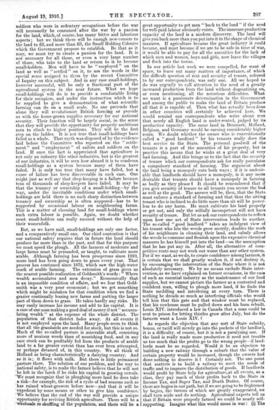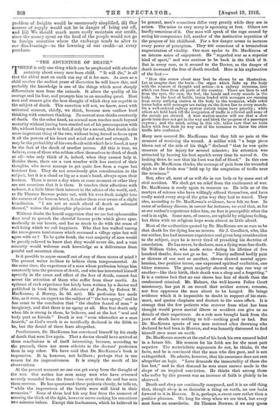SPEED THE PLOUGH.
SOME letters which we print elsewhere prove how many sides of the agricultural question require discussion, and therefore how necessary it is to clear our minds before the end of the war. We do not join in the delusion, of which Mn W. G. Waters complains in his letter, that returning soldiers who were in sedentary occupations before the war will necessarily be consumed after the war by a passion for the land, which, of course, has many bitter and laborious aspects ; but we think there will be enough new-corners to the land to fill, and more than fill, the Small Holding Colonies which the Government propose to establish. Be that as it may, we must try to create a passion for the land. It is • not necessary for all those, or even a very large number of those, who take to the land or return to it to become small-holders. Men will have to be " employed " on the land as well as " settled " on it, to use the words in the special sense assigned to them by the recent Committee of Inquiry on this subject. And in any case small-holdings, however successful, will be only a fractional part of the agricultural system in the near future. What we hope small-holdings will do is to provide a comfortable living for their occupiers, and under the instruction which is to be supplied to give a demonstration of what scientific fanning can do on a small scale. No one pretends that alone they will revolutionize British farming or provide us with the home-grown supplies necessary for our national security. Their function will be largely social, in the sense that they will provide the opportunity for properly ambitious men to climb to higher positions. They will be the first step on the ladder. It is not true that small-holdings have failed as a whole. That myth was disposed of by the evidence laid before the Committee who reported on the " settle- ment " and " employment " of sailors and soldiers on the land. If once the fact is appreciated that agriculture is not only an industry like other industries, but is the greatest of our industries, it will be seen how absurd it is to condemn small-holdings as a system because many of them have failed. It is only too true that many have failed, but a cause of failure has been discoverable in each case. One might just as well say that shop-keeping is a failure because tens of thousands of shop-keepers have failed. It may be that the tenancy or ownership of a small-holding—by the way, under the inevitable conditions under which small- holdings are held there is no such sharp distinction between tenancy and ownership as is often supposed—has to be _supported by occasional labour on neighbouring farms. This is a matter of choosing land for small-holdings where such extra labour is possible. Again, we doubt whether most small-holders can really succeed without the help of their womenfolk.
But, as we have said, small-holdings are only one factor, and a comparatively small one. Our chief contention is that our national safety requires that in future the land should produce far more than in the past, and that for this purpose we must speed the plough. All the farmers of moderate and large firms must be persuaded, or taught, to cultivate more arable. Although farming has been prosperous since 1910, more land has been going down to grass every year. That process has continued since 1872, which saw the high-water mark of arable farming. The extension of grass gives us the nearest possible realization of Goldsmith's words : " Where 'wealth accumulates and men decay." Economically that is an impossible condition of affairs, and we fear that Gold- smith was a very poor economist ; but we get something which might be mistaken for that condition when we find a grazier continually leasing new farms and putting the larger ,part of them down to grass.- He takes hardly any risks. He may easily increase his income and add to his capital. It is a case of one man making a good deal of money if not" accumu- lating wealth" at the expense of the whole district. The • population of that district fades away. At all events it is not employed upon the land. Many people seem to think that all the grasslands are needed for stock, but this is not so. Much of the so-called pasture is miserable stuff, consisting more of noxious weeds than of nourishing food, and in any ,case stock can be profitably fed from the products of arable land to a far greater extent than has ever been attempted, • or perhaps dreamed of, in this country. We all think of Holland as being characteristically a dairying country. And so it is ; it flows with milk. But there is little permanent ,pasture there. The solution of our problem, and the way to national safety, is to make the farmer believe that he will not be left in the lurch if he risk's his capital in growing cereals. mubt recognize that in plaughing more land he does take a risk—for example, the risk of a cycle of bad season's such as has ruined wheat-growers before now--and that it will be 'expedient by some means or other to give hixn confidence.' •• We believe that the end of the war will provide a unique opportunity for reviving British agriculture. • There will be a 'wholesale re shuffling of the popuhtion; and there will- be a great opportunity to get men "back to the land" if the need for well-paid labour obviously exists. The immense productive capacity of the land is a modern discovery. The land will give you back more than you put into it in the shape of chemical manures. If agriculture became the great industry it could become, and must become if we are to be safe in time of war, it would be able to pay for all the amenities for the lack of which men and women, boys and girls, now leave the villages and flock into the towns.
In our article last week we were compelled, for want of space, to leave out many matters of importance, of which the difficult question of rent and security of tenure, referred to by our correspondents, was only one. All we hoped to do was urgently to call attention to the need of a greatly increased production from the land without dogmatizing on, or even mentioning, all the notorious difficulties. What we want is a passionate determination in the Government and among the public to make the land of Britain produce all that it is capable of. Then what has actually been done in other countries will ,certainly be achieved here. We would remind our correspondents who write about rent that nearly all English land is under-rented, judged by its productive capacity. The same land in Denmark, Holland, Belgium, and Germany would be earning considerably higher rents. We doubt whether the owner who is conventionally called a "good landlord" by his tenants really does the best service to the State. The personal goodwill of the tenants is a part of the amenities of his property, but in practice this means that he winks at a great deal of very bad farming. And this brings us to the fact that the security of tenure which our correspondents ask for really postulates a compulsory standard of farming. The argument about the land being a monopoly cuts both ways ; if it is undesir- able that landlords should have a monopoly, is it any more desirable that tenants should have a monopoly in farming as badly as they please ? It should be remembered that if you give security of tenure to all tenants you secure the bad as well as the good. The answer will be, then, that the State must enforce a standard of farming and that thus the sitting tenant who is inclined to do little more than sit will be power- less to do any harm. He must cultivate his land properly or get out; and only the wilfully incompetent will not have security of tenure. But let us ask our correspondents to reflect upon how one act of State intervention leads to another. The so-called "good landlord" takes an indulgent view of his tenant who lets the weeds grow merrily, doubles the work of his neighbours in cleaning their land, and calmly allows the weeds to consume and flourish upon the expensive chemical manures he has himself put into the land—on the assumption that he has put any. in. After all, the alternative of com- petitive rents may not work out worse than any other system. For if we want, as we do, to create confidence among farmers, it is certain that we shall greatly weaken it, if not destroy it, by encouraging the intervention of the State where it is not absolutely necessary. We by no means exclude State inter- vention, as we have explained on former occasions, in the ease of such an essential industry as the maintenance of our food supplies, but we cannot picture the farmer as a contented and confident man willing to plough more land, if he finds the State meddling and interfering at every turn. There is nothing he dreads so much as interfering officials who would tell him that this gate and that window must be replaced, that his cowhouse must be pulled down and his barn rebuilt. Louis XIV. introducod a law in Canada that a man could be sent to prison for letting thistles grow after July, but do the farmers want a Louis XIV. ?
As regards the objection that any sort of State subsidy, bonus, or tariff will merely go into the pockets of the landlord, it is a difficulty, of course, but it is not a paralysing one. If the land is really made more productive it need not trouble us too much that the profits go to the wrong people—if land- lords must be so regarded. Would it be an objection to building a new railway through a suburb that the value of certain property would be increased, though the owners had done nothing to deserve it ?• Certainly not. The one point that matters is to build a railway to meet the needs of traffic and to improve the distribution of goods. If landlords would profit by State help for agriculture, at all events, as s class, they pay much of their profits back to the State in Income Tax, and Super Tax, and Death Duties. Of course, 'there are bogies in our path, but if we are going to be frightened by bogies, the terrors of which are greatly exaggerated, we shall turn aside and do nothing. Agricultural experts tell us that if Britain were properly farmed we could be nearly self- 'supporting. Imagine what this would mean' in war : (i) The problem of freights would be enormously simplified, (ii) Our sources of supply would not be in danger of being cut off, and (iii) We should much more easily maintain our credit, since the money spent on the food of the people would not go to foreign countries where the exchange tends to alter to our disadvantage—to the lowering of our credit—at every purchase.




























 Previous page
Previous page